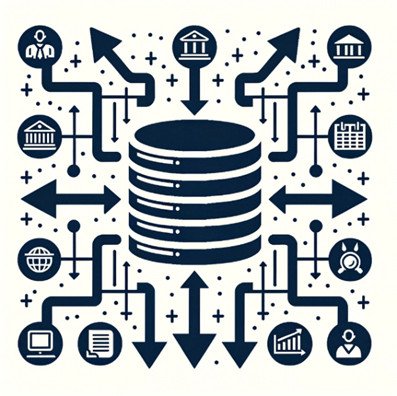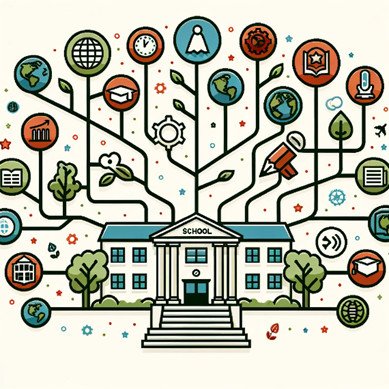Education Matters: Data-Driven Decision-Making in Nepal’s Education Reform

In the previous installment of this series “From Theory to Practice”, I explored the challenges of bridging the gap between educational theory and classroom application in Nepal. I discussed the need for a balanced approach that combines traditional and modern pedagogical techniques. In this article, the focus shifts to another crucial facet of education: Data-Driven Decision Making. I turn my attention to the imperative of fostering a culture centered around research and meticulous data management. I discuss how a well-designed system for collecting and analyzing data can serve as a cornerstone for informed policy decisions and, ultimately, contribute to elevating the standard of education in Nepal.
The Imperative of Data-Driven Decision Making
Data-driven decision-making in education serves as a cornerstone for improving both student and school performance. According to a seminal study entitled “Making Sense of Data-driven Decision Making in Education” by Marsh and team (2006), this approach involves the systematic collection and analysis of various types of educational data—ranging from input and process to outcome and satisfaction metrics—to guide a plethora of decisions. Key aspects include setting goals, monitoring progress, targeting interventions, evaluating programs, and driving continuous improvement. The effective execution of this approach necessitates educators’ data literacy skills, timely access to quality data, and the capacity for nuanced interpretation and responsive action. In high-performing educational systems, this data-driven ethos is deeply embedded across multiple layers of research, from federal and state studies to individual academic pursuits in journals. As Henry Ford’s dictum goes, “If you don’t measure it, you won’t improve it”. Developed countries consistently gather a diverse array of metrics, including those related to education and health, to guide decision-making. Research within these systems is multifaceted, covering areas such as politics, teacher effectiveness, student characteristics, mental health, and various educational outcomes. The end goal transcends mere comparative analysis; it aims for actionable insights that contribute to both immediate and sustained improvements in educational performance.

In contrast, Nepal lacks a basic culture of data keeping let alone rigorous data collection and research. During my PhD, I sought to analyze basic enrollment and completion rates but found major gaps and roadblocks in getting access to desired data. Notably, it was large international NGOs—rather than Nepali governmental agencies—that could provide you with needed educational data. This stands as a testament to Nepal’s reluctance to adopt a data-driven approach to education, a gap that places it at a disadvantage compared to other nations. Educational expert Darling Linda-Hammond notes, that two-thirds of today’s young people will enter jobs that don’t yet exist, using technologies that haven’t been invented (Darling-Hammond, 2015). Given this rapidly changing landscape, Nepal can’t afford to fall behind. To catch up and potentially leapfrog, a shift toward embracing the capabilities of Artificial Intelligence and stringent data-driven decision-making is not just advisable, but essential.
A Roadmap for Data-Driven Educational Reform
Now is the time to reevaluate the essence of our educational system. We could, as usual, lament our grievances and point fingers at various elements, but I invite you to shift the focus. Contrary to common blame games, the real culprits behind low academic achievement, declining faith in our educational system, and even the strong inclination to leave Nepal are not our students. I propose that we initiate this by conducting comprehensive multidimensional surveys involving all stakeholders—students, parents, community leaders, teachers, administrators, researchers, and policymakers. This multi-faceted inquiry would not only provide invaluable insights but also create short-term employment opportunities, especially important in the post-COVID-19 economic landscape.

Upon collecting this critical data, once aggregated in a central warehouse, it is publicly accessible for research at all levels—local, national, and international. Legislative mandates should ensure that a portion of governmental budgets at all tiers is earmarked for ongoing research, evaluation, and monitoring. This aligns with UNICEF’s call to fortify Nepal’s educational databases and address disparities in educational outcomes, including children with disabilities. By standardizing data inputs and focusing on evidence-based interventions, we can transform educational challenges into informed solutions. This collaborative approach offers a realistic pathway for progress, particularly as Nepal navigates the complexities of its new federal governance structure.
Role of Universities and Grants in Research
The comprehensive surveys and subsequent data aggregation provide a fertile ground for academic exploration. Universities, often seen as mere centers for learning in the context of Nepal, get great opportunities to evolve into research hubs. By establishing specialized academic journals that welcome submissions on a broad range of educational topics, they can offer a platform for scholarly discourse. Faculty (professors, lecturers, instructors, etc.) and graduate students could apply their subject-matter expertise to interrogate the data, thus generating actionable insights. This is not an exclusive domain for higher-level academics; even undergraduates could be looped into this research ecosystem, gaining practical experience, and contributing fresh perspectives.
Beyond serving platforms for research and publication, universities have a role in initiating and sustaining research endeavors. To do this, they should utilize a variety of incentives—grants for faculty, research stipends for graduate students, and course credits for undergraduate participation. This could be further bolstered by external grants from governmental and private entities, thus diversifying the funding pool. The culture of inquiry and innovation fostered through these initiatives would make universities instrumental in shaping our educational policy. By integrating contributions from a diverse academic community, universities can synthesize a multi-faceted understanding of our educational landscape, thereby informing evidence-based policy decisions and driving systemic improvements.
However, it is crucial to note that the primary focus should remain on quality education, and research should not be so pervasive as to detract from this core mission. While data has a role, it should serve as a tool to complement, not replace, proven teaching strategies. A balanced approach keeps the focus on transforming instruction, which although challenging, remains key to genuinely improving educational outcomes (Data was supposed to fix the U.S. Education System by Simon Rodberg, 2019).
Significance of Teacher and Student Research
Teacher effectiveness has long been a focal point in educational research due to its critical influence on student outcomes. Researchers have employed a value-added model (VAM) to quantify the impact of teacher quality on student achievement across various educational domains. It’s important to note that VAM is but one metric for assessing teacher effectiveness, a notion underscored by comprehensive studies like the Measures of Effective Teaching (MET) project funded by the Bill and Melinda Gates Foundation. The MET findings advocate for multiple measures, including student surveys and classroom observations, to be used in tandem with VAM for a more holistic assessment of teacher performance. Simultaneously, there’s an ongoing body of research focusing on the role of student characteristics, especially mental health, and its impact on educational outcomes. Conditions like anxiety and depression are increasingly being recognized for their potential to impair academic performance, making schools vital for early identification and intervention. Interestingly, these two lines of inquiry intersect; teachers, often the first to observe changes in student behavior and well-being, can initiate targeted interventions, thereby deepening our understanding of the intricate relationship between teacher quality and diverse student needs.
On the flip side, research carried out by teachers and students themselves is instrumental in improving educational quality, fostering professional learning, and driving ongoing improvements. Various methods of inquiry, such as teacher action research and participatory models, allow educators to examine their own practices while also involving students in the research process. Countries with better education systems conduct ongoing research into both initial teacher education and continuing professional development. From preservice preparation to in-service training, this research-oriented approach equips educators to critically evaluate existing studies and undertake their own research initiatives. Platforms that enable the dissemination of research findings contribute to establishing a culture centered around data-driven decision-making, effectively bridging theory and practice to improve educational outcomes on multiple fronts.
Data Centers and Data Management
Data has rightfully been dubbed the “new gold” of the 21st century, holding immense potential to catalyze innovation if harnessed properly. Just as gold can be mined to create valuable products, data can be analyzed to develop customized educational services and tools tailored to student’s diverse needs, according to experts like Thomas Davenport and D.J. Patil in a Harvard Business Review article. Robust data management is key; it involves collecting, cleaning, analyzing, and interpreting raw data to generate actionable insights that can inform targeted interventions and even predict future trends, as outlined in a McKinsey Global Institute report. With the rise of AI, quality data has become even more critical as fuel for developing powerful machine-learning algorithms that can revolutionize education. These technologies are powered by data; better data enables more accurate and useful models. Developed nations are investing billions in aggregating massive datasets to train advanced AI systems for education, including at-risk students and enabling personalized education. Reflecting surging worldwide demand for data infrastructure and management, global investment in data centers reached over $48 billion in 2021, representing a 40% increase compared to 2020, and with data center demand continuing to accelerate globally, investment in the sector is projected to see robust growth for many years to come.

As Nepal embraces AI to regain lost footing in education, building robust data centers and management capabilities across all educational institutions is an imperative first step. By fostering a culture of proper data governance and inviting diverse research partners to interrogate this data, Nepal can harness the tremendous power of information—the new gold—to chart an evidence-based course and propel its education system forward.
Privacy and Ethical Concerns
While the potential of educational data to drive reform is immense, the sensitivity surrounding student data demands particular care, given that children are involved as research subjects. Researchers, educators, and analysts are ethically bound to operate with transparency, maintain confidentiality, and minimize potential harm. This extends beyond adhering to international regulations such as FERPA in the United States or the Data Protection Act in the European Union. Rather, it’s about cultivating a culture of ethical stewardship throughout the entire data lifecycle. Specific attention should be given to marginalized groups, including minorities and students with disabilities, to prevent misuse or discrimination, as emphasized by research (e.g., Dahlen, 2020; Mandinach & Gummer 2016) to name a few.
Furthermore, ethical data handling is especially crucial in the evolving technological landscape. With developing infrastructures potentially vulnerable to breaches, comprehensive frameworks for data security and privacy are needed as governance continues to advance. Rather than checklist compliance, these guidelines should enable the ethical use and protected storage of data. In doing so, they can build the foundation of trust and accountability. Meticulous attention to privacy and ethics will allow us to harness the power of data to benefit education while safeguarding individual rights.
Research Beyond Academic Content
Educational research often centers on academic achievement, test scores, curriculum, and pedagogy. However, for a comprehensive, data-driven approach, the scope must expand beyond this narrow focus. Politics in education, including policy decisions and governance structures that shape resource allocation across diverse settings and populations, warrant greater attention. Furthermore, research should adopt an interdisciplinary lens spanning fields like psychology, sociology, and architecture. As scholars such as Gardner and Darling-Hammond have highlighted, factors like school culture, student engagement, teacher efficacy, and physical infrastructure profoundly influence outcomes. By broadening the areas of inquiry using a holistic framework, research can generate nuanced insights to drive meaningful reforms in education.

Furthermore, a comprehensive understanding of education extends to long-term student achievements, which go beyond academic performance to include socio-emotional development, career readiness, and civic engagement. Given Nepal’s developing context, the role of technology in education is another domain that demands scholarly attention, especially concerning the digital divide. By adopting an interdisciplinary approach, we can explore factors such as school environments, teacher-student relationships, and the physical infrastructure of learning spaces, thereby gaining a nuanced understanding of the educational ecosystem. This comprehensive perspective equips us to make evidence-based decisions that are both impactful and sustainable, thereby enriching the quality of education on multiple fronts.
Call to Action
The imperative for data-driven education extends beyond academia, requiring diverse stakeholders to engage. Policymakers must mandate ethical data governance while channeling resources into research that informs evidence-based reforms. Academic institutions—especially higher education bodies like Tribhuvan University and Kathmandu University, etc.—need to build research capabilities and disseminate insights. Tech firms should develop solutions democratizing data access and analysis. Most crucially, individuals—students, parents, and educators—must view data as a dynamic tool, unlocking the potential to elevate the learning and knowledge landscape.
Ultimately, we must remember the human dimension behind the data, representing people’s aspirations. The urgency for nuanced, ethical reforms is clear. The time is just right for collective action to leverage data in shaping policies, enriching learning environments, and ensuring equitable opportunities. By embracing a multifaceted approach that establishes ethical frameworks, we can transform data into a catalyst for impactful, sustainable change in Nepal’s education system.
As this "Education Matters" series concludes, I extend my heartfelt thanks to readers for accompanying me in probing Nepal's complex educational terrain. This series has aspired to catalyze both dialogue and transformation, covering an expansive range of topics from curriculum nuances to the imperative of empathy in educational settings. While this final article marks a milestone, it by no means signifies the end of our collective quest for a more equitable and effective education system in Nepal. I earnestly hope these discussions ignite enduring commitment and collaborative action. Your continued engagement is invaluable—feel free to share your thoughts and queries with me at [email protected]. Thank you for your investment in this journey; let's maintain the momentum for meaningful change!



Leave Comment